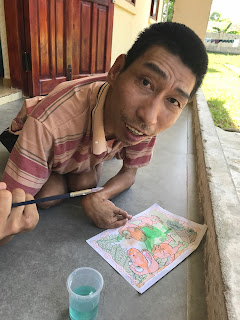I recently was reading research by Jeffrey Goldstein Ph.D. from Utrecht University on play in children's development, health and wellbeing. (www.originalplay.com/develop.html). He had the following to say (the entire post is his words) and it rang true for me thinking about all the kiddies here where mission:nam'possible frequents, and how they have limited opportunities to play.
"Recent developments in biology, psychology and neuroscience lend credence to the importance of play in human evolution and development. Play may even be the cornerstone of society because it requires communication and cooperation among people playing different roles and following agreed-upon rules.
People play because it is fun. One of the many ways in which play is healthy is that it results in positive emotions, and these may promote long-term health.
Active play has the paradoxical effect of increasing attention span and improving the efficiency of thinking and problem solving. Two hours of active play per day may help reduce attention deficits and hyperactivity.
In the Western world, nearly everyone believes that children benefit from free play. Research confirms that children’s self initiated play nurtures overall development, not just cognitive development (such as learning to name colours, numbers or shapes). Abundant research has shown that play during early childhood is necessary if humans are to reach their full potential.
Parents, teachers and government bodies all recognise the value of play. Yet opportunities for play continue to diminish, with fewer play spaces, less freedom to roam outdoors, and decreasing school time for free play. The case for play is clear, now the question is what do we do to ensure that children get the play they need and deserve?
Play promotes joy, which is essential for self-esteem and health. The learning process is self-sustained based as it is on a natural love of learning and playful engagement with life.
‘A child who is not being stimulated, by being... played with, and who has few opportunities to explore his or her surroundings, may fail to link up fully those neural connections and pathways which will be needed for later learning.’ (Sutton-Smith 1997, p. 17, as cited in Goldstein, 2012). Because play promotes brain growth and development, ‘children who do not have sufficient opportunities to play will experience impaired brain development and flexibility (Else, 2009, p. 85 as cited in Goldstein, 2012)."
Even all the disabled residents had a blast playing with all these toys. What really made my heart ache was watching the 40 year old residents get involved with games for preschoolers. They too, are stuck in the room with nothing to do 24 hours a day. Alot have physical disabilities but people assume they also have cognitive delays as well. They forget that a physical delay does not equate to a mental impairment.















































No comments:
Post a Comment